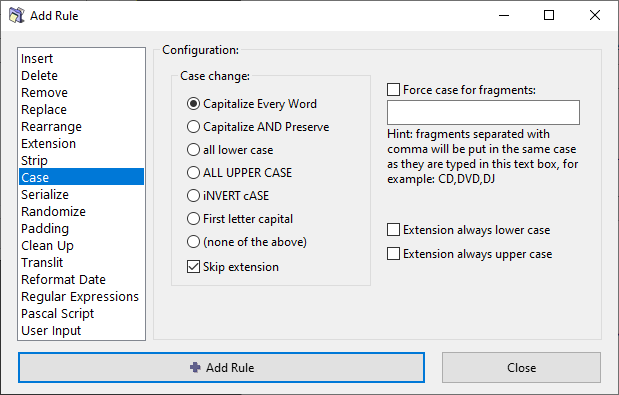ReNamer:Rules:Case: Difference between revisions
No edit summary |
|||
| Line 28: | Line 28: | ||
| Force case for fragments | | Force case for fragments | ||
| | | | ||
This option forces the case of specified text-fragments (strings) in the file name. <br> | This option forces the case of specified text-fragments (strings) in the file name. <br> | ||
<u>Note</u>: This check box is coupled with the box below it. (Enter the fragments in the box and then activate the option by selecting the check box.) | <u>Note</u>: This check box is coupled with the box below it. (Enter the fragments in the box and then activate the option by selecting the check box.) | ||
* | *You can set any case for the strings (ALLCAPS, Only first letter capitalalized, lowercase, MixedCase, etc.) | ||
You can set any case for the strings (ALLCAPS, Only first letter capitalalized, lowercase, MixedCase, etc.) | |||
* | *You can specify ''multiple'' strings at a time, each with its own case format. To separate the strings from each other, put a comma between them.<br>(Note: In versions prior to v5.50, a space was used instead of a comma.)<br> | ||
You can specify ''multiple'' strings at a time, each with its own case format. To separate the strings from each other, put a comma between them.<br>(Note: In versions prior to v5.50, a space was used instead of a comma.)<br> | |||
* | *The case for these strings will be set exactly as entered in the box, regardless of the options selected in '''Case change''' list. | ||
The case for these strings will be set exactly as entered in the box, regardless of the options selected in '''Case change''' list. | |||
Here are some typical examples of such strings: | Here are some typical examples of such strings: | ||
{| | {| cellspacing="1" cellpadding="1" border="1" style="width: 499px; height: 175px;" | ||
|- | |- | ||
| align="center" | '''Case'''<br> | | align="center" | '''Case'''<br> | ||
| align="center" | '''Examples'''<br> | | align="center" | '''Examples'''<br> | ||
|- | |- | ||
| | | | ||
ALLCAPS<br> | |||
| | | | ||
CD, DVD, TV, HTML, XML, C++, USA, GIMP,<br> | |||
|- | |- | ||
| | | | ||
Only the First letter capitalized<br> | |||
| | | | ||
Java, India, English, Sunday, Easter, February<br> | |||
|- | |- | ||
| | | | ||
Mixed case<br> | |||
| | | | ||
OpenSUSE, OpenOffice, ReNamer<br> | |||
|} | |} | ||
<br> | <br> | ||
|- | |- | ||
Revision as of 07:47, 20 May 2010
Case Rule

This rule changes the case of the filename. Options are: capitalize, to lower case, to upper case, invert case, and put only first letter capital (as in a sentence).
There is also an option to force case for specific text-fragments, such as CD, DVD, RF, etc. These fragments would not look natural in any other case (e.g. cd, dvd, rf), so the rule allows you to prevent changing the case of such terms in one stroke.
The parameters are as follows:
| Parameter | Details | ||||||||
|---|---|---|---|---|---|---|---|---|---|
| Case change | Several options are offered.
| ||||||||
| Skip extension | If this check box is selected, the extension will be ignored by the rule. | ||||||||
| Force case for fragments |
This option forces the case of specified text-fragments (strings) in the file name. Note: This check box is coupled with the box below it. (Enter the fragments in the box and then activate the option by selecting the check box.)
Here are some typical examples of such strings:
| ||||||||
| Extension always lower case | Forces the extension to lowercase.
Note: This setting overrides any other setting that can alter the extension. For example, consider a case where the ALL UPPER CASE option is selected and the skip extension option is deselected. Logically, the extension should be converted into ALLCAPS. But if the Extension always lower case option is selected, the case of the extension will be converted to lowercase.This setting will override even the fragments case-conversion. |